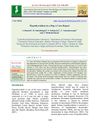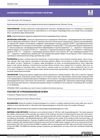 293 citations,
November 2005 in “Trends in Immunology”
293 citations,
November 2005 in “Trends in Immunology” Stress can worsen skin conditions and stop hair growth by affecting the body's stress response system.
160 citations,
April 2014 in “Drug discovery today” Melatonin helps regulate sleep and may aid in treating various health issues.
 159 citations,
December 2007 in “American Journal of Pathology”
159 citations,
December 2007 in “American Journal of Pathology” Stress-related substance P may lead to hair loss and negatively affect hair growth.
155 citations,
December 2002 in “Journal of Investigative Dermatology” Thyroid-related genes are active in skin cells and may affect autoimmune conditions.
 105 citations,
January 2009 in “Medicine”
105 citations,
January 2009 in “Medicine” Hirsutism is more linked to high androgen levels than acne or hair loss, and a mix of hormonal tests is best for diagnosis; certain treatments can reduce symptoms.
 74 citations,
July 2010 in “The Journal of Clinical Endocrinology & Metabolism”
74 citations,
July 2010 in “The Journal of Clinical Endocrinology & Metabolism” Treatment of acromegaly can improve women's reproductive health issues caused by hormonal imbalances or tumors.
 56 citations,
October 2018 in “Journal of The American Academy of Dermatology”
56 citations,
October 2018 in “Journal of The American Academy of Dermatology” Androgens play a complex role in skin conditions like acne and hair loss in women, and normal blood levels don't always show true androgen status.
 38 citations,
October 2006 in “Fertility and Sterility”
38 citations,
October 2006 in “Fertility and Sterility” The document concludes that identifying the cause of amenorrhea is crucial for proper treatment.
35 citations,
January 2018 in “Vitamins and hormones” DHEA affects various tissues by interacting with multiple receptors and can be converted into sex hormones.
 24 citations,
November 2016 in “Molecular Medicine Reports”
24 citations,
November 2016 in “Molecular Medicine Reports” Hormonal imbalances, often indicating conditions like PCOS, are common in women with hard-to-treat acne, and a treatment approach addressing these imbalances may be needed.
20 citations,
December 1994 in “Fertility and sterility” Flutamide combined with a low-dose birth control pill effectively reduces excessive hair growth in women with polycystic ovarian disease.
 17 citations,
July 2015 in “Biomolecules and Biomedicine”
17 citations,
July 2015 in “Biomolecules and Biomedicine” High Nesfatin-1 and low Vitamin D may increase blood pressure and heart rate in women with PCOS.
13 citations,
January 2014 in “Journal of Veterinary Internal Medicine” The cat's hypothyroidism was successfully managed with levothyroxine, leading to a stable condition.
11 citations,
November 2009 in “Journal of steroid biochemistry and molecular biology/The Journal of steroid biochemistry and molecular biology” Bolandiol, a synthetic steroid, builds muscle and bone without greatly affecting sex glands, and works differently from other hormones.
 9 citations,
July 2020 in “Experimental Dermatology”
9 citations,
July 2020 in “Experimental Dermatology” Topical L-thyroxine may help with wound healing and hair growth but should be used short-term due to potential risks.
 9 citations,
June 2014 in “European Journal of Obstetrics & Gynecology and Reproductive Biology”
9 citations,
June 2014 in “European Journal of Obstetrics & Gynecology and Reproductive Biology” Blood AMH levels are higher in women with PCOS than in those with other similar conditions.
 8 citations,
December 1981 in “Journal of The American Academy of Dermatology”
8 citations,
December 1981 in “Journal of The American Academy of Dermatology” The document concludes that parathyroid diseases have a range of clinical features and outcomes, with some conditions being treatable and others having a high risk of mortality.
 6 citations,
December 2022 in “Frontiers in Pharmacology”
6 citations,
December 2022 in “Frontiers in Pharmacology” Quercetin may help improve symptoms of polycystic ovary syndrome.
 6 citations,
February 2021 in “Journal of Ovarian Research”
6 citations,
February 2021 in “Journal of Ovarian Research” 150 kHz electromagnetic radiation might help improve PCOS in rats.
 6 citations,
January 2019 in “F1000Research”
6 citations,
January 2019 in “F1000Research” High triglyceride levels are a key factor affecting testosterone levels in women with PCOS.
 6 citations,
June 2017 in “Reproductive Biomedicine Online”
6 citations,
June 2017 in “Reproductive Biomedicine Online” Chinese women with PCOS have higher androgen levels, which change with age and weight.
 4 citations,
September 2021 in “Frontiers in allergy”
4 citations,
September 2021 in “Frontiers in allergy” The conclusion is that understanding the complex relationship between allergies, autoimmunity, and psychological factors is key to treating skin disorders with itching.
4 citations,
January 2018 in “JBRA assisted reproduction” Orlistat helped reduce weight and testosterone in obese women with PCOS but did not significantly affect other androgens or cholesterol levels.
 2 citations,
February 2023 in “BMC endocrine disorders”
2 citations,
February 2023 in “BMC endocrine disorders” Curcumin improved some metabolic factors in women with PCOS but did not affect cholesterol, insulin, or testosterone levels.
2 citations,
August 2022 in “Middle East Fertility Society Journal” The new rodent model successfully mimics non-lean human PCOS symptoms.
 2 citations,
December 2018 in “International journal of current microbiology and applied sciences”
2 citations,
December 2018 in “International journal of current microbiology and applied sciences” The dog recovered from hypothyroidism and regrew its hair after two months of treatment.
 1 citations,
June 2023 in “Nutrients”
1 citations,
June 2023 in “Nutrients” Vitamin D deficiency is linked to a higher chance of metabolic syndrome in women with PCOS.
 1 citations,
May 2021 in “Problemy e̊ndokrinologii”
1 citations,
May 2021 in “Problemy e̊ndokrinologii” Androgen levels can increase at any age, affecting symptoms like acne, hair loss, and prostate size.
 1 citations,
February 2017 in “Journal of gynecology and womens health”
1 citations,
February 2017 in “Journal of gynecology and womens health” The document concluded that more research is needed to understand how estrogen affects the enzyme involved in hirsutism development.
 February 2024 in “Biomedicines”
February 2024 in “Biomedicines” Hormones like androgens, estrogen, thyroid hormones, and stress hormones can contribute to hair loss, and treatments target these hormonal imbalances.






















